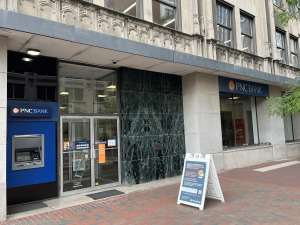
Supreme Court rejects Biden’s plan to cancel $400 billion in student loans
The court held that the administration needs Congress’ endorsement before undertaking so costly a program.

The court held that the administration needs Congress’ endorsement before undertaking so costly a program.
Such proposals are likely to face resistance from the banking industry and some congressional Republicans, who argue that the Fed had the necessary tools to prevent the bank collapses but failed to use them.

The Fed’s report issued Wednesday did show some relative weakness among the midsize banks and “super regional” banks, with some getting a passing grade with a smaller cushion than usual. Those results could raise eyebrows among investors and policymakers.

All told, U.S. homeowners with a mortgage lost a combined $108.4 billion in home equity between the first quarter of last year and the first three months of 2023.
The Consumer Financial Protection Bureau issued a consent order last week against Fishers-based Phoenix Financial Services over alleged violations of federal debt-collection and credit-reporting laws.
An emerging pullback should be welcome news for the Federal Reserve, which has been taking aggressive steps for more than a year to slow the economy enough to bring down inflation.
The SEC filed lawsuits last week against the world’s biggest cryptocurrency exchanges, Binance and Coinbase, deepening tensions between the government and a volatile industry that has been marred by scandals and market meltdowns.
The S&P 500 is now in what Wall Street refers to as a bull market, meaning the index has risen 20% or more from its most recent low. Here are some answers to questions about bull and bear markets.

The student loan forgiveness program faces legal challenges, and the Supreme Court is set to issue a ruling on its legality before the end of June.

When the Federal Reserve meets next week, it is widely expected to leave interest rates alone—after 10 straight meetings in which it has jacked up its key rate to fight inflation. But that doesn’t mean its done with hikes.
The Securities and Exchange Commission widened its sweeping crackdown on crypto by accusing Coinbase Global of running an illegal exchange, a move that could make it harder for the industry to operate and for U.S. citizens to trade.

Teachers Credit Union on Tuesday said the rebranding better reflects its “mission to empower and serve all people and grow beyond its original educator roots.” It will also mean a name change for TCU Amphitheater at White River State Park.

The average prime rate, or the rate banks set as a reference for customer loans, was 4%. The prime rate has more than doubled since then, hitting 8.25% in May.
A federal consumer watchdog on Thursday warned consumers that money kept in payment apps is not automatically insured by the government and could be completely lost if the companies fail.

While President Biden has promised to veto the bill, the vote in the Senate, in which two Democrats and an independent sided with Republicans, shows the divisiveness of the student loan policy and the difficulty of getting any future plan through Congress.

Leading Federal Reserve officials are sending out stronger signals that they will forego an increase at the central bank’s next meeting, though they indicate hikes could resume later this year.

In a letter to customers, PNC said it plans to close the branch in mid-August while leaving its other downtown branch open.
The stubbornness of high inflation is dividing the Federal Reserve over how to manage interest rates, leaving the outlook for the Fed’s policies cloudier than at any time since it unleashed a streak of 10 straight rate hikes.

In April 2022, Cummins announced plans to spin off the business, then known as Cummins Filtration, which provides filtration products for trucks, off-highway industrial equipment and power generation systems.

Local entrepreneur and general partner Scott Kraege co-founded Ivy Ventures with Mike Reynolds, CEO of Indianapolis-based Innovatemap, and John Wortman, CEO and co-founder of Carmel-based Valeo Financial Advisors LLC.